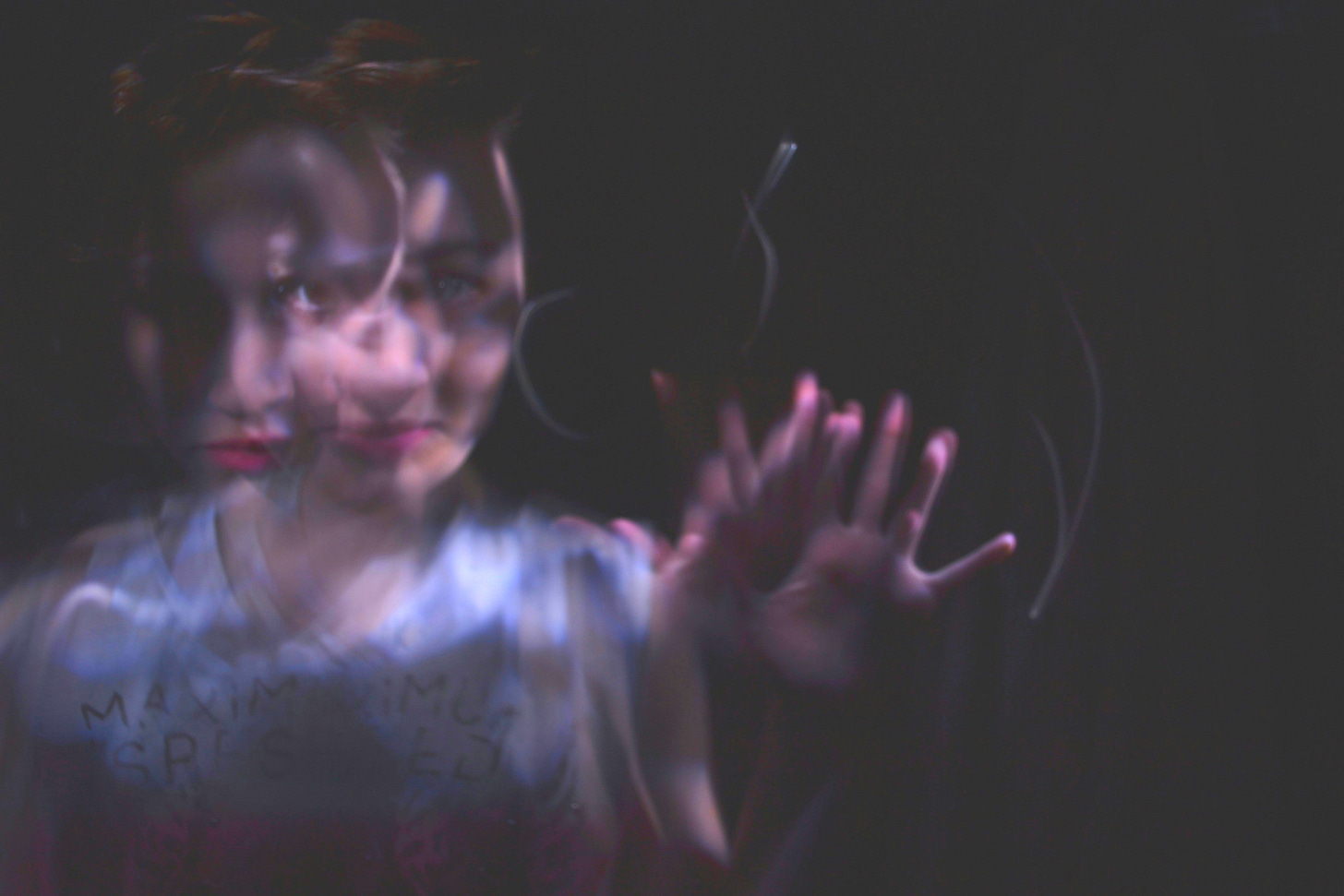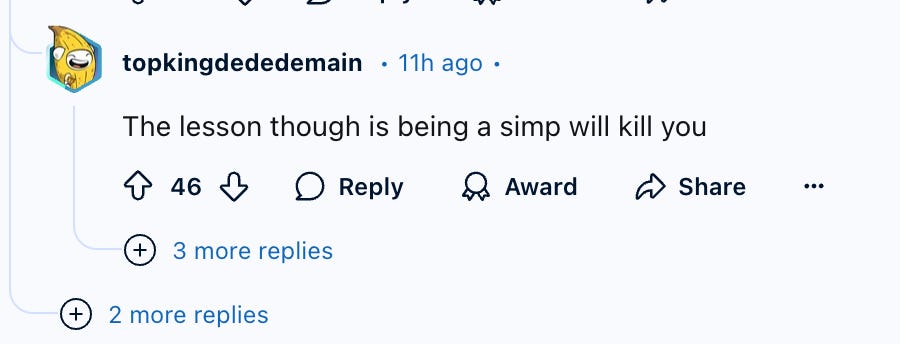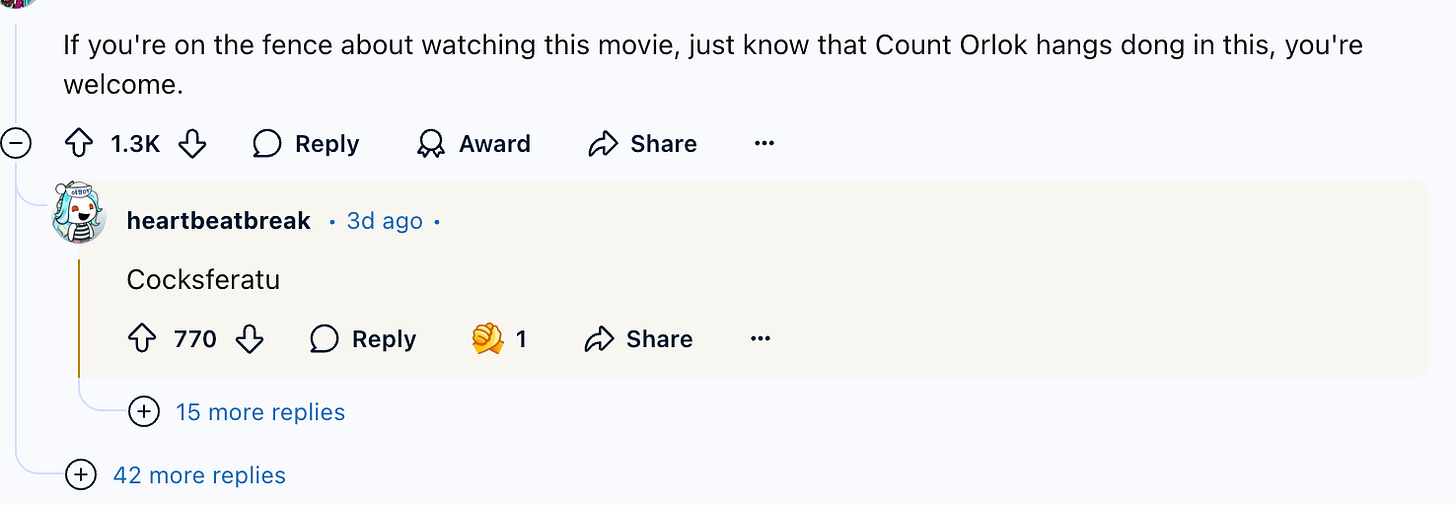Nosferatu Understands That Shame Is The Shadow Of Love
A few days after watching it, there's still one thing I'm thinking about (and it's not vampire dong.) CONTAINS SPOILERS.
First, let’s get a few things out of the way.
This piece is full of spoilers for Nosferatu (2024) and The Witch (2015) so go watch those then come back so we can chat.
Next, an admission: Folk horror is one of my favorite things in the world. The combination of pastoral beauty, creeping dread, and discussions of fate and legend is like a narcotic to my modern-world-weary brain. It’s at once soothing and terrifying when done well and Robert Eggers’ The Witch (2015) is my favorite example of the genre. But Nosferatu is a close second.
I saw it Christmas Day, with an audience that had its fair share of folks unable take in a dramatic 19th century German Expressionist-style flick without shouting out something they probably thought was brilliant when they heard it in 7th grade. (At the suggestion of a boner: “Oh yEAHHHHH!”)
I left the theater pissed and was going to write something that was more like an irreverent list of things I thought during the movie than a serious analysis, but in the last few days, something emerged that I thought was really worth discussing. So now I want to talk about shame.
SPOLERSSSSSSs!!~ AHOY, SPOILERSSSSSS!
Buried about 3/4 of the way through the movie, Ellen (Lily-Rose Depp) explains that she feels the demon Nosferatu is a manifestation of her shame.
Years prior to the start of our story, Ellen was lonely, psychic, and probably hitting puberty. Rejected by her father for her sinful behaviors (being psychic and getting a period) she wished for a companion and for someone to love her. She wished for a savior but, because beggars can’t be choosers, accidentally summoned something sinister. The spirit of a hulking Transylvanian nobleman with a very large mustache.
At first, their love affair gives her exactly what she’s missing in her life. She is seen, she is held, she is loved and not rejected. Then their relationship becomes abusive and now, as she sees it, the demon is a manifestation of all the shame she harbors for her “sins.”
And that’s what Eggers is so good at reminding us: Shame, if not actively destroyed, will destroy you and everyone you love.
Shame of your truest self will destroy any identity you’ve built to try to escape it. Rejecting your needs and desires will only lead you to ruin. You can’t build a beautiful life on top of a shoddy foundation. Trouble comes when you don’t address the root of the problem.
I relate to this as someone who’s battled many strains of shame in my adult life. Shame over sexual desires that turned into abuses, shame over being “too much” or “too loud” or “too quiet” or “not commanding enough.”
As a woman, it’s likely you’re taught to feel shame for being catcalled, being harassed, being abused. Shame for when you’re the victim. Shame for when something bad happened to you because you needed help or comfort. The world of men loves to pin shame on a woman.
Women learn to feel shame over their own sexuality, over our own experiences with our mental health.
All of this shame is the same shame women like you and me and Ellen have felt for centuries, except in Nosferatu, Ellen has a literal demon pursuing her, obsessed with destroying her — and he’s the only one who knows and accepts her!
Her husband doesn’t understand her psychic abilities, or her melancholy (whomst among us…) and with him, she is reduced to a two-dimensional version of herself. A paper doll Ellen that must perform contentedness and mental stability so her husband and her friends aren’t burdened by her sadness and her visions.
Have you ever been not OK but told people you were OK just so you weren’t inconveniencing them?
If anytime during the movie I thought, “Damn, Lily, do you still need to be crying?” I returned to this premise:
Everyone in Ellen’s world secretly despises her because she’s a burden. Because she’s inconveniencing them with her troubles. Everyone, that is, except her Nosferatu (and Willem Dafoe, of course, because he’s perfect.)
After summoning the demon, Ellen is disgusted further with herself, disgusted with him, and has even more shame to deal with in reconciling the complexity of her desires and how she is responsible for all this grief around her.
So in this way, Nosferatu not-so-subtly examines the difficulty of being a young woman in a world ruled by men just like Eggers’ 2015 masterpiece (quote me) The Witch.
SPOILERS FOR THE WITCH!!R($&$*#@$
In the end, who does the title of The Witch really refer to? A woman who’s been cast out of society for her malicious, supernatural deeds.
She’s the witch of the woods who steals the baby Sam, she’s Thomasin, too: the young girl growing into a woman, being blamed for her father’s egotistical choice to leave their colony, being called a slut by her mother while absorbing leering looks from her father and brother, being blamed for losing her baby brother (who was actually stolen by a witch!!), and being blamed for making a satanic pact with the family goat (???) until she gets the chance to escape that world of blame by embracing the label of “witch” (and then actually making a satanic pact with the family goat.)
Until then, she’s searching for answers in prayer, looking within herself for a way to prove to her family that she’s not evil and absorbing their hatred as a scapegoat for their own shame.
Ellen similarly rejects herself and her shame until the point at which she needs comforting, turns away from her father, who has already rejected her, and makes a covenant with a spirit who will embrace her as she is.
It’s an utter tragedy for both of these characters and yet, there’s a definite “good for her” feeling to it — for me, at least. Because being a woman in a world ruled by men has never, ever changed. The difference is the window of what is acceptable public torment has shifted slightly, and hatred and rejection of women and womanly things isn’t as outright in the mainstream these days, it’s much more insidious.
My expectations for Nosferatu were high, but I went in with a clear head because no one can live up to the hype of, “this movie is going to save me mentally.” In a way, it did. Society so often dismisses the needs of women that it’s validating to see a man tell the story.
And although there is stuff that drove me a little crazy (why is everyone in such a heightened emotional state from the get? Where can they take that in a way that won’t exhaust the audience?) I ultimately succumbed to its darkness because all of it was justified. Looking at the story through the lens of shame and how it colors behavior and destroys lives, all of it feels justified.
In the real world, we don’t get to conjure a monster to destroy it as an effigy. When you’re dealing with shame, you simply go forward and scrape it off of your spirit every day and try to be more forgiving with yourself, lest you fall prey to it ever-eternally.
SOME FUN STUFF
I went on Reddit and started reading after the movie probably because I was still pissed at that one attention-starved audience member for ruining the last scene for the whole theater.
Anyway, I loved a lot of the comments on Reddit. Some faves:
“Merlin lookalike gets cucked by Dr. Robotnic Pennywise.” So validating, Poopyoself.
“Nah, Peter Stormare as drawn by Mark Mignola.” Hell yes. Astute.
Sandwiching in one last thing about Lily-Rose Depp’s performance: Her physical work is a special part of this movie, in my opinion.
For an actor that could easily have phoned in a performance grounded in nothing but frailty and swooning, she went for it in a way that commands respect. She went ugly, she went truly dark, and she was likely exhausted after every day of shooting.
There was a lot of love for Skarsgård’s cryptid dong performance.
Thanks for reading.
There’s an excellent documentary you can watch about folk horror called Woodlands Dark and Days Bewitched.









Wow, what a beautifully raw and thoughtful dive into the shadowy heart of Nosferatu and The Witch! Your passion for folk horror shines through every word, and it’s impossible not to feel inspired by how deeply you’ve connected with these stories of shame, identity, and societal rejection.
You’ve captured something so resonant about Robert Eggers’ ability to layer historical dread with themes that are painfully modern. Ellen and Thomasin’s struggles feel both timeless and achingly current, and your exploration of shame as both a personal and societal demon hits home. That juxtaposition of being seen yet unseen, loved yet rejected, feels like the core of what makes these films so haunting—and, honestly, relatable.
I also love how you highlighted the performances, especially Lily-Rose Depp’s willingness to push herself into the depths of despair. It’s rare to see actors go “ugly” in the service of a story, and she clearly left nothing on the table.
As for those hilarious Reddit comments, they’re the perfect palate cleanser after such a heavy exploration. “Merlin lookalike gets cucked by Dr. Robotnic Pennywise” absolutely deserves to be immortalized somewhere.
Your write-up reminds me why I love folk horror so much—the way it balances beauty and terror, the personal and the universal, the real and the surreal. Thanks for sharing this! Let’s hope 2025 brings us even more films that peel back the layers of our darkest selves.
I rarely want to see movies in the theater these days but I’m definitely gonna see it now.
I haven't seen "The Witch" but I'll probably give it a go as well. The trailers for this film reminded me of Coppola's "Dracula" in parts. Shame as a theme definitely plays well against this period of the movie where social mores were so suffocating. Essentially that's what all vampirism of the that period draws from: sex and death which they often went hand in hand back then. Very Freud and Jung.
I wanted to see a film that took risks. That tried to reach for something, to actually say something other than the formula I can now spot like painting by numbers.
I'll see it this week and re-read your piece again. Thanks for writing this. :)